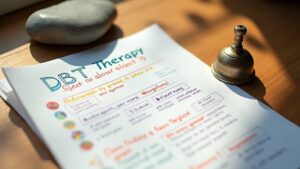Dialectical Behavior Therapy (DBT) offers practical tools to handle overwhelming emotions, improve relationships, and navigate life’s toughest moments. This cheat sheet breaks down the four key skill sets—mindfulness, distress tolerance, emotion regulation, and interpersonal effectiveness—into easy-to-use strategies. Whether struggling with impulsive reactions or feeling stuck in negative patterns, these techniques provide a roadmap for lasting change. The real power lies in practicing them consistently, transforming chaos into clarity one step at a time.
The Four Core Modules of DBT
While DBT could seem intimidating initially, breaking it down into its four core modules makes it simpler to comprehend. The first, initial, opening, teaches staying present without judgment, helping people notice thoughts and feelings without reacting impulsively.
Next, interpersonal effectiveness skills focus on building stronger relationships through via using setting boundaries and communicating needs clearly. These skills prevent conflicts while maintaining self-respect.
The third module, distress tolerance, helps manage crises without worsening the situation, like riding out intense emotions safely. Finally, emotion regulation helps identify and change painful feelings, reducing emotional suffering.
Together, these modules create a balanced approach to handling life’s challenges. Through Via By way of practicing them, individuals gain tools to navigate emotions, relationships, and stress more effectively, leading to greater stability and confidence in daily life.
Mindfulness Skills for Present-Moment Awareness
Mindfulness skills help individuals focus on the present moment with awareness and clarity.
Core mindfulness practices teach observing thoughts and sensations without reacting or judging them. Non-judgmental observation allows people to experience reality as it is, reducing stress and emotional distress.
Core Mindfulness Practices
To build present-moment awareness, core mindfulness practices teach individuals how to engage with their experiences in a deliberate, nonjudgmental manner. These mindfulness skills help people notice thoughts, emotions, and physical sensations without getting stuck in them.
Through observing experiences with acceptance and describing them objectively, individuals learn to stay grounded in the current moment. Conscious breathing anchors attention, fostering a state of “being mind” rather than overthinking.
Wise Mind—the balance between emotion and logic—emerges when individuals participate fully in activities without judgment. This practice reduces rumination and sharpens focus, making it easier to handle daily challenges.
Over time, these techniques cultivate a calmer, more centered way of living. The goal isn’t to empty the mind but to witness experiences with clarity and kindness.
Non-Judgmental Observation
Non-judgmental observation builds on core mindfulness through shifting attention to how experiences unfold, not whether they’re “good” or “bad.” This skill encourages noticing thoughts, emotions, or physical sensations the way a scientist could study data—with curiosity and without labeling.
To practice, people observe their experiences in the present moment with acceptance, describing them factually instead of adding evaluations. Watching a thought like “I’m failing” without reacting helps create distance from distress. Engaging fully in activities—like eating slowly and noticing textures—sharpens focus.
Over time, this approach balances problem-solving with the “being mind,” reducing impulsive reactions. Grounding in the present through neutral observation fosters calm awareness, making emotions feel less overwhelming. Regular practice rewires automatic judgments into mindful responses.
Distress Tolerance Techniques for Crisis Management
Distress tolerance techniques help individuals handle overwhelming emotions during crises.
The STOP skill guides people to pause and reassess situations before reacting. TIPP skills and the Wise Mind ACCEPTS strategy offer additional tools to regulate emotions and refocus attention.
STOP Skill Breakdown
As emotions feel overwhelming, the STOP skill offers a straightforward way to regain control. It helps people pause and respond thoughtfully rather than react impulsively during distress.
The skill works in four steps:
- Stop: Freeze the moment instead of acting on intense emotions.
- Take a step back: Create distance from the situation to avoid escalating reactions.
- Observe: Notice thoughts, feelings, and surroundings without judgment.
- Proceed mindfully: Choose a balanced action that aligns with long-term goals.
TIPP Skills Explained
As emotions feel like they’re spinning out of control, what can someone do to quickly regain balance? TIPP skills, a set of distress tolerance skills in DBT, offer fast-acting techniques to manage overwhelming feelings. These methods target the body’s physical responses, helping to reset emotional intensity.
| Skill | How It Works | Example |
|---|---|---|
| Temperature | Cools the body, reducing arousal | Splash cold water on the face |
| Intense Exercise | Burns off emotional energy | Jumping jacks or a brisk walk |
| Paced Breathing | Slows heart rate, calms mind | Inhale 4 sec, exhale 6 sec |
| Progressive Muscle Relaxation | Releases tension | Tense and relax muscles head to toe |
These TIPP skills provide immediate relief, making crises feel more manageable. Through focusing on physical sensations, they create space for clearer reasoning.
Wise Mind ACCEPTS
- Activities: Distract through immersing in tasks—cleaning, reading, or walking—to shift attention away from distress.
- Sensations: Use strong physical stimuli (cold showers, textured objects) to interrupt overwhelming emotions.
- Contributing: Help others (volunteering, kind acts) to create positive feelings and a sense of purpose.
These tools provide immediate relief, helping regain control during crises.
Emotion Regulation Strategies for Balanced Responses
Emotions can feel overwhelming, but learning to manage them helps create balanced responses even in difficult moments. Emotion regulation involves identifying and labeling feelings accurately, which reduces confusion and helps individuals act more skillfully. Acknowledging that emotions serve a purpose—like signaling needs or threats—makes them easier to handle.
When people develop clear emotional awareness, they can make wiser decisions instead of reacting impulsively. Strategies like deep breathing, pausing before responding, or reframing thoughts lessen the intensity of overwhelming emotions. Practicing these techniques builds resilience over time, allowing for calmer reactions during stress. Emotion Regulation isn’t about suppressing feelings but comprehending and guiding them toward healthier conclusions. With consistent effort, emotional balance becomes more natural, fostering steadier responses in challenging situations.
Interpersonal Effectiveness for Healthier Relationships
Healthy relationships often depend on clear communication and balanced interactions, something interpersonal proficiency abilities can help reinforce. The DEAR MAN technique teaches how to ask for needs assertively while keeping connections intact. It breaks down into Describe, Express, Assert, Reinforce, stay Mindful, Appear confident, and Negotiate.
Meanwhile, the GIVE skill fosters gentle, validating conversations—key for repairing strained bonds.
- DEAR MAN: A structured approach to asking clearly without aggression.
- GIVE: Prioritizes listening and kindness to de-escalate conflicts.
- FAST: Helps uphold self-respect by avoiding unnecessary apologies.
These tools balance priorities and boundaries, ensuring needs are met without sacrificing respect. Practicing them builds confidence in maneuvering tough conversations, making relationships feel safer and more fulfilling. Over time, they shift dynamics toward mutual comprehension and healthier connections.
Understanding the States of Mind in DBT
In DBT, the three states of mind—rational, emotional, and wise—shape how people process experiences and make decisions. While rational mind relies on logic and emotional mind reacts impulsively, wise mind blends both for balanced responses.
Learning to recognize and shift between these states helps individuals navigate challenges with greater clarity and control.
Wise Mind Approach
As a person grapples with overpowering emotions or becomes entangled in excessive rumination, the wise mind approach in DBT assists in bridging the divide between logic and feelings. This balanced state combines the clarity of rational thought with the depth of emotional insight, fostering better decision-making and emotional regulation.
Unlike the extremes of pure logic or unchecked emotions, wise mind helps individuals respond thoughtfully to challenges.
Key aspects of cultivating wise mind include:
- Awareness – Noticing whenever emotions or logic dominate without judgment.
- Integration – Blending facts and feelings to find balanced solutions.
- Practice – Regularly pausing to check in with oneself, especially during distress.
Emotional Vs Rational
| Emotional Mind | Rational Mind |
|---|---|
| Reacts quickly to feelings | Could dismiss emotions |
| Can lead to impulsive acts | Might overlook emotions |
| Intense but short-lived | Calm but detached |
Understanding both minds allows individuals to pause before reacting. The goal isn’t to eliminate emotions but to balance them with reason, creating space for wiser choices. This awareness is a foundation for healthier responses.
Balancing Opposing States
- Pause and observe – Notice as emotions or logic overpower the other.
- Reflect on needs – Ask: *What’s the emotion saying? What’s the logic suggesting?*
- Practice integration – Merge both perspectives to find a middle path.
Practical Exercises to Develop Wise Mind
To develop the ability to make balanced decisions between logic and emotion, practicing specific DBT exercises can help strengthen the connection to Wise Mind. Mindfulness is key—slowing down with deep breathing or the STOP skill (Stop, Take a step back, Observe, Proceed mindfully) creates space to notice emotions without reacting impulsively.
Opposite Action is another tool; when anger urges aggression, acting kindly disrupts the emotional spiral. Journaling builds self-awareness through identifying patterns in feelings and reactions. The “what” and “how” skills—observing, describing, and participating nonjudgmentally—train the mind to stay present.
These exercises, practiced regularly, help blend emotional intuition with rational thought, making Wise Mind more accessible during stress. Small, consistent efforts lead to clearer, calmer decision-making over time.
Building a Personalized DBT Toolkit
- Customizable Resources: Therapy worksheets and coping strategies adapt to individual needs.
- Portable Support: Digital files work on phones, tablets, or printed copies for quick reference.
- Clear Guidance: Simple explanations and visuals help apply skills during tough instants.
Having tools ready reduces stress as challenges arise, turning theory into action. The goal is creating a personal collection that fits daily life.
Applying DBT Skills in Daily Life
Daily life often feels like a whirlwind of emotions, responsibilities, and unexpected challenges, but DBT skills act as an anchor, helping people stay grounded. Through weaving mindfulness into routines—like pausing to observe thoughts without judgment—people cultivate self-awareness. Regulation skills, such as naming emotions or using deep breathing, make overwhelming moments feel manageable.
Simple habits, like jotting down gratitude or practicing compassionate self-talk, reinforce emotional balance. Alternating between problem-solving (“doing mind”) and acceptance (“being mind”) prevents burnout. Small actions, such as noticing physical sensations or adjusting reactions in conflicts, build resilience over time. These tools don’t erase stress but create a steadier path through it. With consistent practice, DBT shifts from theory to reflex, turning daily struggles into opportunities for growth.
Overcoming Challenges With DBT Techniques
- Mindfulness anchors: Pausing to observe thoughts without judgment lowers reactivity.
- Distress tolerance: Techniques like deep breathing or grounding help withstand crises.
- Emotion regulation: Labeling feelings accurately prevents overwhelming responses.
Interpersonal conflicts or intense emotions could test these skills, yet DBT reframes obstacles as learning opportunities. Small steps—like journaling or brief mindfulness exercises—build resilience over time. The focus isn’t perfection but steady growth, blending acceptance with gradual change.
Conclusion
Mastering DBT skills is like planting seeds in a garden—each practice nurtures growth, even if progress feels slow. With time, mindfulness roots deeper, emotions settle like calm waters, and relationships bloom with care. Obstacles could bend but not break those who tend their toolkit patiently. Every small step forward, though unseen at the start, eventually paints a life sturdier and brighter than before. The path isn’t perfect, but it’s profoundly attainable.





